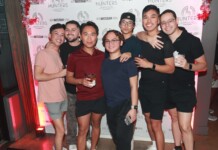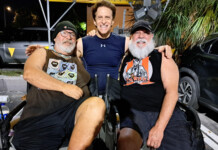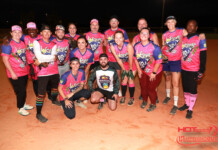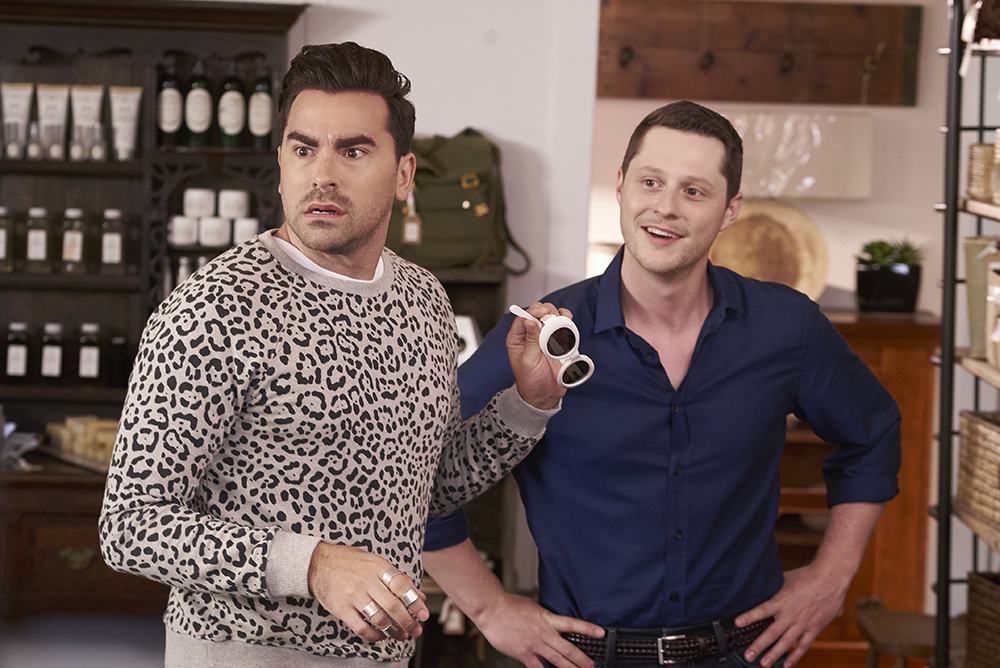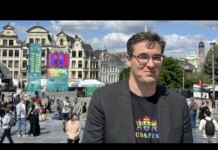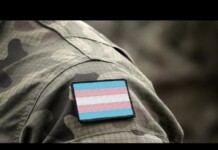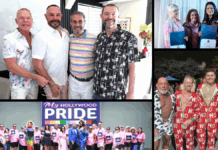Next time you see Dan Levy, thank him.
Thank him for “Schitt’s Creek”, his super-bingeable comedic riff on a once-affluent family forced to live like fish out of Perrier in the podunk Canadian town the show is named after. And thank him, he who created and developed the series, which premiered in 2015 on Pop TV (and can also be seen on Netflix), for willfully remaining single only to craft and deliver more rib-tickling bons mots for the show’s fourth – and most affectionate – season. Thank him again while you’re at it, because the 34-year-old former MTV Canada co-host has somehow found the time to create yet another queer-themed project that he tells me is in the works.
But let’s not get ahead of ourselves, for now we have David Rose (Levy), replete with his color-averse apparel and drop-crotch pants, general distaste for people, and his animated and generally disgusted facial contortions worn like memes in the making. Johnny, David’s perpetually on-edge father, is played by real-life father and “American Pie” and “Best in Show” actor Eugene Levy, who also serves as the comedy’s co-creator. Together they’ve developed both a comedic knockout and a rich what-if satire of Kardashian life.
“Schitt’s Creek” also stars Catherine O’Hara, as the deliciously histrionic wig-loving family matriarch and former soap star Moira, and Annie Murphy as Alexis, the self-involved-but-somehow-sweet daughter who once argued with David over who would get murdered first in their sketchy new motel digs.
Via an allegorical wine conversation with hotel co-owner Stevie Budd (Emily Hampshire) presented in the show’s first season, “Schitt’s Creek” expertly tackled David’s pansexuality (“I do drink red wine, but I also drink white wine; I like the wine, not the label”). Then there was a throuple, and now there’s Patrick (Noah Reid), a yin-yang match so absolutely perfect for David – notice all the ways he challenges David, especially with the potential mortification of this season’s open-mic night at the store they co-own together – you’d be heartbroken if they didn’t last.
Read on as Levy freewheeled his way through our conversation about living vicariously through David and Patrick’s loving relationship, opening the minds of parents with queer kids, and how David has influenced him to “to try to live my life more out loud.”
WATCH:
As a gay man, how personally rewarding is it to you to have one of the healthiest, most normal relationships on the show be between two queer men?
You know, all I really can do is think back to a time when I didn’t think being myself was ever going to be a possibility. It’s such a full circle moment for me right now to be writing this love story for them and to look back at it and just remember that there was a time in my life when I honestly didn’t think that would be a possibility for myself. So, it’s incredible. And to have the network support to really be able to tell the kinds of stories that I want to tell with it and not have any interference is rare and a privilege. When you have that kind of freedom, there’s also a certain level of responsibility to try and tell the most authentic story you possibly can. I think with these two characters I didn’t want to reduce it to caricature. I didn’t want it to be some kind of lesson that we’re trying to ram down someone’s throat. It was really about presenting a story of two people who have found love with each other.
You’ve made very deliberate choices regarding the treatment of David’s sexuality both as it relates to him and also as it relates to the other people in his life.
Personally, I never learn when someone is trying to teach me something. I learn through experience, and presenting complete tolerance and acceptance across the board is the only scenario that should be existing right now. I want to show this without trying to make it feel like an educational lesson for people who don’t quite understand it.
The letters that I’ve gotten from families who are more conservative leaning and who have never quite understood the fight – to have letters from these people explaining that they’ve never had a point of entry before, that was the most amazing and eye-opening part of this whole conversation. In a way, it opened my eyes to understanding them a little bit better and understanding that sometimes I look at it with “how can I not see the bigotry?” but at the same time, if people do not know what they do not know, all you can try to do is guide them with a gentle hand.
You guided Larry King with a gentle hand last year when you were on “Larry King Now” to talk about the show. It was really interesting to watch the dynamic between you and Larry as you explained pansexuality to him – that must’ve opened up a lot of eyes who hadn’t even heard the word “pansexual.”
It’s about having conversations. We should have more of them. Talk to people instead of coming at things with bats swinging – and don’t get me wrong, there are times when that is absolutely necessary. But I think when it comes to the world of sexuality, which is ever-changing, try to have a conversation with people and lead them down the path of acceptance by way of setting an example.
I’ve had great conversations with people on the streets who’ve come up and told me that when they came out of the closet their parents didn’t quite understand them, but by watching the show and seeing how accepting Johnny and Moira Rose are to their kids – the fact that it was never a question – allows them to feel safer, allows them to feel like, “Oh, why am I having such a problem with it when these people who I’ve come to know and love are not asking the same questions that I’m asking? Why am I asking them then?” And it’s changed the conversation in their house. You can’t ask for a more rewarding takeaway from the experience.
Did you need characters like them when you were younger?
It’s interesting, because it’s still kind of an ongoing conversation on the show in terms of Patrick being fresh out of the closet and exploring what that means. There’s fear on either side. And, yes, I grew up knowing that my parents ultimately would not have a problem with it, but when you’re going through that and you’re internalizing that much fear you get to a point where you ask yourself, “Well, maybe they will have a problem with it; maybe I’m misreading the situation.” There are so many questions that I think we’re forced to ask ourselves because we’re alone in that process.
Which show with queer themes did you gravitate toward most as you were coming into your own?
I guess it would be ”Will & Grace”. I think “Will & Grace” really opened up the conversation. “My So-Called Life” affected me more just because I was such a huge fan of the show. I think we’ve come a long way, and there’s still a long way to go, but all you can really do is seize the opportunities that are given to you and try and make good with the power that TV can offer.
I watched the sixth episode of the new season, “Open Mic,” and it was the first time that I ugly cried watching the show. In fact, until then, I hadn’t cried listening to Tina Turner’s “Simply the Best” either. When is the last time you serenaded a man?
Never! Because the intention is always to keep them! (Laughs) (That scene) all stems from a conversation I had with a friend of mine who was seeing someone who chose to sing to them and it really just disrupted the whole momentum of their relationship because, unlike Noah who has such a beautiful voice, this person did not, and it just didn’t work out in the end. But I knew Noah could sing, and I knew he was a musician going into it, so it was always my intention to somehow find a way for him to sing.
You know, I don’t love writing dialogue where people are talking about their feelings. I would much rather bring some fun, interesting and dynamic ways of showing that kind of feeling, and the idea that David would be so off-put and embarrassed by his partner choosing to sing in front of a room full of people – and then to know that Noah has this voice, and that in the end we could use this as a device to really cement them as a couple in ways that I don’t think they even expected – was really special.
And I had always had this fondness for the lyrics for that song, and for a long time whenever it came on at a bar or something, I would always be the person turning to someone saying, “The lyrics to this song are “really” beautiful.” When you’re listening to the Tina Turner version it’s just a pop song and people are like, “Yeah, I know, it’s fine,” and it’s like, “No, no, no – the lyrics are “really” beautiful.” So, when we thought of this idea, it was the _only_ option, this idea that Patrick would sort of tease David with a flashy pop song but make it his own.
What is so lovely about that scene is it really subverts stereotypes about small town small-mindedness – the townies are there, and they’re celebrating Patrick and David’s love for each other right along with them.
It was our intention from the get-go to never make the town the butt of the joke and to always make the family sort of the joke. We wanted the town to always be this safety net for these people, and for them to always feel safe there.
Well, it gave me lots of hope.
Oh, good! That’s what we’re aiming to do, to be just a bit of a safe place for people for 21 minutes and 50 seconds a week.
Where does the line between Dan Levy and David Rose start and end?
Uh, there’s a big one! It’s interesting. Yeah, I would kill for his confidence.
WATCH:
I’d kill for some of his style. Every time I watch him I’m like, “Clearly, I need more black and I need more flow.”
(Laughs) It’s funny, ’cause in promoting the show we talked to someone who was going through some of the outfits and it was sort of a “yay or nay?” situation and it came upon the outfit that we wear when we’re doing the number (in episode three, “Asbestos Fest”). I’m in, like, black with a baby’s breath sweater with matching pants and the person decided to “nay” the outfit and I had to gently tell her that those pants were actually my own from home (laughs). Generally speaking, I wouldn’t wear it with a matching top, but I did wear it at one point in my real life.
I think I’ve always been excited about fashion, so to be able to style the show with our costume designer really just scratches that itch for me. As a character, though, I don’t think we’re alike. I think some of our neuroses probably exist – the lack of patience (laughs) – but you know, it’s funny, you start the first season of the show and these people are on paper at least really hard pills to swallow, and the intention of the show was to always make the takeaway “love doesn’t cost any money” and these people will slowly start to realize that. My takeaway from David has been to try to live my life more out loud because I think his unabashedness when it comes to just being authentically himself at all times is something I wish I employed in my own life.
But you do seem to be much more open about your sexuality than before the show.
I think when you start out it’s a really tough track to navigate. You can be really comfortable in your personal life, but the professional world is a very different beast. When gossip blogs were outing people – I really do feel like it’s such a tender thing; it’s a very sensitive thing for people, and there should be no pressure to do anything until you’re ready. I do know that there’s obligation, obviously, that comes with being someone who’s in the public eye and being able to use that, but for me it was just that you grow into yourself and you grow into what you want to share with people publicly. Because yeah, I do think that conversation is a tricky one, and actually, I am sort of naturally quite private and don’t like attention. (Laughs)
Last year your co-star Emily Hampshire, who plays Stevie, told me men expect her to be Stevie on dates and that she feels bad she’s not.
I know. She always says that: “Stevie’s so cool … and then I show up.” (Laughs)
Do you have an example of that happening to you?
Being a disappointment to people? Yes! (Laughs) No – I think David has brought out the best in me as a person in terms of what I want to stand for and the kinds of things I want to fight for. I also have realized in ways that I never did before the reach that this show has to actually affect change in people’s homes, and you know, you have to run with that and you have to wave that flag proudly because there’s a lot of opposition out there. You have to constantly make sure that your megaphone is being heard over all the noise, which is why it was such a thrill for GLAAD to sponsor our LA event and to participate in the fundraising campaign. And again, you get to see people coming out of the woodwork and people of all different sort of backgrounds sending love to David and Patrick. It’s incredible to watch.
They’ve instilled hope that, maybe, people aren’t just looking for a quickie on Grindr.
Exactly.
It’s refreshing.
Yeah, it’s been really fun to play, and in a way, I often wonder if I wrote that as almost some kind of personal manifestation. If you write it, they will come. (Laughs)
Are they coming?
Not at the moment, but hopefully soon. It’s all so tricky because we put so much of our time into this show and, for me, it’s a 13-month commitment, so it’s hard to be open and available to someone in a relationship when my eye will always tend to wander back to the show. It’s finding the balance. But yeah…one day.
Are you interested in creating or playing more realistic portrayals of queerness that cut beyond caricature in the way David has?
Of course, yeah. There is a new show that I’m working on right now with quite an amazing queer character that I quite love. I wish I could tell you more about it. It’s pretty fun, and if it all works out we will talk again and I will give you the lowdown. But yes, if all goes to plan then there might be a new show coming out in the next couple of years.




